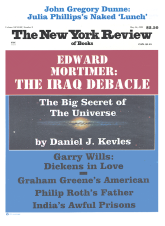In response to:
In God We Trust from the February 14, 1991 issue
To the Editors:
In his review of Garry Wills’ Under God [NYR, February 14], C. Vann Woodward missed an opportunity to set the record straight. According to Wills, Henry Steele Commager and Arthur Schlesinger, Jr. are two eminent historians “for whom much of American history simply does not exist” because they allegedly ignore the important role of religion. Curiously, these two historians were among the first secular liberal scholars to recognize that role. Commager’s Theodore Parker: A Yankee Crusader (1936) is nothing less than a tribute to a Transcendentalist as a Christian hero. Schlesinger’s Orestes A. Brownson: A Pilgrim’s Progress (1939) offered a brilliant, sympathetic analysis of America’s greatest Catholic social philosopher. But these matters of omission are minor compared to the author’s conviction that religion and skepticism are incompatible and that in America religion has its most powerful expression in evangelical fundamentalism. Could it be that Wills has written a book prefaced by the assumption that religion is absent in American historiography only because he failed to perceive its true presence?
Wills seems to assume that because a historian sees the American mind as “skeptical, pluralistic, irreverent, and relativist” (Schlesinger), that historian cannot account for America’s religious sensibility. Yet anyone who has read Perry Miller or Reinhold Niebuhr will appreciate what Edmund Burke was forced to recognize in the eighteenth century: American Protestants love nothing so much as to “protest” and “suspect,” and thereby challenge authority and interrogate philosophy, even in full awareness that reason may be corrupt and the will decayed. The New England Calvinist “Augustinian strain of piety” (Miller) gave America what George Santayana called “an agonised conscience,” a religious mentality haunted not only by guilt but by the thought that we may not really know how we know what we think we know. A Calvinist sense of sin enabled humankind to understand its own finitude and the contingency and relativity of all knowledge. “Sin,” Niebuhr reminds us, “is the refusal to admit finiteness.” Precisely what Wills’ righteous fundamentalists refuse to admit.
Wills has many learned and valuable things to say about religion and politics in America, even if he starts off on the wrong foot by declaring that historians have neglected the significance of religion. Some of us may simply feel that religion belongs to intellectual history, and that any book that gives prominence to Jim Bakker and Jimmy Swaggert, at the expense of Jonathan Edwards and Anne Hutchinson, is truly “history from the bottom up.”
John Patrick Diggins
Distinguished Professor of History
CUNY Graduate Center
New York City
C Vann Woodward replies:
It seems to me that Professor Diggins’s quarrel is with Garry Wills, not with me. As for missed opportunities, it was I who pointed out that Arthur Schlesinger’s statement, “I hold religion in high regard” had been overlooked, and it was Diggins who mistakenly attributes to Wills a characterization of both Schlesinger and Commager that was intended for one. Surely neither of these celebrated historians needs a defender with bibliographical citations at hand. As for such debates as that over “the thought that we may not really know how we know what we think we know,” I would bet that Wills, a learned Jesuit seminarian, is quite capable of holding his own.
This Issue
May 16, 1991



